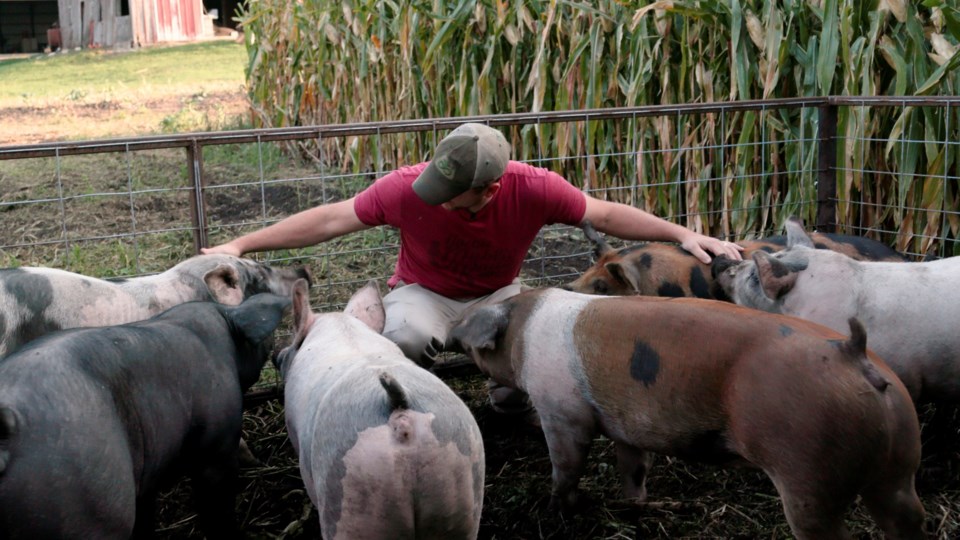The makers of the influential 2008 documentary ŌĆ£Food, Inc.ŌĆØ never planned to make a sequel. They figured theyŌĆÖd said it all in their harrowing look at a broken, unsustainable food system ŌĆö a system led, they argued, by a few multinational corporations whose monopoly squeezes out local farmers, mistreats animals, workers and the soil itself, and makes all of us less healthy.
But 16 years after that Oscar-nominated film, theyŌĆÖre back with What happened? Well, first of all, the pandemic ŌĆö an event that both strained our food system and revealed its precariousness, they say.
Also, the filmmakers suggest, it was perhaps naive to assume that informed, ethical shoppers could alone reverse such an entrenched narrative. ŌĆ£You can change the world with every bite,ŌĆØ the first film had argued, urging consumers to buy local and organic, patronize farmerŌĆÖs markets, demand healthy school lunches and most of all, read labels and understand what they're eating.
Now, much of that is happening. But some problems have worsened, and new ones have emerged. ŌĆ£We really thought we could change the system one bite at a time,ŌĆØ says investigative author and producer Michael Pollan ("The Omnivore's Dilemma"), who's back with frequent commentary along with fellow author/producer Eric Schlosser ("Fast Food Nation"). ŌĆ£As important as that is, itŌĆÖs not enough."
Directed by Robert Kenner and Melissa Robledo, the new film begins, as did the first, with an inspiring image out of a painting ŌĆö here, a tractor gliding along a field of crops under a glistening sun. If youŌĆÖve seen the original, you'll know such a scene will soon yield to images of unsavory assembly lines, ŌĆ£kill floorsŌĆØ at slaughterhouses, or workers earning pennies in fields.
A lot has happened since 2008. More people are interested in what they're eating and where it's from. Farmer's markets are everywhere, and supermarkets carry organic and GMO-free food, because consumers want it.
But, Pollan reminds us, the industry is still dominated "by a handful of very large and very powerful companies.ŌĆØ In normal times this power is invisible, but when the pandemic hit, the curtain was peeled back, he says. We see images of countless hogs euthanized because they couldn't be processed, and farms disposing of perfectly good milk. At the same time, many supermarket shelves were empty, and people lined up in their cars, hungry. This, the film argues, is what happens when only a few companies are in charge. Some babies don't get their formula, for example.
As with the first film ŌĆö the style is very much the same ŌĆö we're taken across the country (and beyond), listening to a stream of voices: organizers, workers, farmers, nutritionists, politicians, entrepreneurs, scientists. (Occasionally we donŌĆÖt know who's talking for a few seconds, which can be confusing.)
In Immokalee, Florida, lifelong farmworker (and labor leader) Gerardo Reyes Chavez explains how immigrant workers ŌĆö mostly Latino and Haitians ŌĆö are both relied upon and mistreated. ŌĆ£The industry wants immigrant workers because they feel they can take advantage of us," he says. If we're eating fruits and vegetables, Schlosser and Pollan tell us, we're part of a chain of exploitation.
With flashy, colorful and user-friendly graphics, the film traces industry consolidation: the few companies who have 70% of the carbonated drinks market, for example, or 80% of the baby food market. Such realities violate the spirit of antitrust legislation, they argue.
We meet people like Wisconsin dairy farmer Sarah Lloyd, whose 450-cow farm feels huge to her, but other farms have 5,000 or 10,000 or 20,000 cows. How can she compete?
Marion Nestle, biologist and nutritionist at New York University, looks back a few decades and marvels at how food has has become something available anytime, anywhere: ŌĆ£You go into a clothing store and there are candy bars at the checkout counter." She especially marvels at the escalating portion size over the years, a thought illustrated by a stack of pancakes that keeps on growing.
A professor in Brazil, Carlos Monteiro, posits that ŌĆ£ultra-processedŌĆØ foods are a key factor in diabetes. His ideas are borne out by an experiment at the National Institutes of Health that shows people who eat such highly processed foods consume a whopping 500 more calories per day. Mark Schatzker (ŌĆ£The Dorito Effect") talks about artificial flavors and how they trick the body into eating more.
Are there solutions to all this? The filmmakers consider a bunch, approving of some more than others. Everyone's coming up with ŌĆ£plant-basedŌĆØ substitutes (fake chicken wings, honey without bees.) But Pollan worries consumers might think ŌĆ£plant-basedŌĆØ means healthy food ŌĆö often, it's nothing of the kind. One promising idea: An ocean farmer, Bren Smith, is farming kelp, and a chef is using it in her restaurant.
The most emotional moment concerns Taco Bell, but not the food there. Fran Marion, a Taco Bell worker (and activist) has a tear streaming down her face as she describes the challenge of feeding her children and avoiding living out of her car. She does not get health care or sick leave, she says, and as an adult has never been able to afford seeing a doctor. She speaks of working all day with food and coming home to hear her son's stomach growl.
The film ends where the last one did: with a call to action. ŌĆ£Join us in transforming our food system," it says, providing a website where viewers can get involved. The danger is the same, they say, as it was back in 2008: ŌĆ£Monopoly power is a threat to our freedom.ŌĆØ
ŌĆ£Food, Inc. 2,ŌĆØ a Magnolia Pictures release, is unrated by the Motion Picture Association. Running time: 94 minutes. Three stars out of four.
Jocelyn Noveck, The Associated Press



